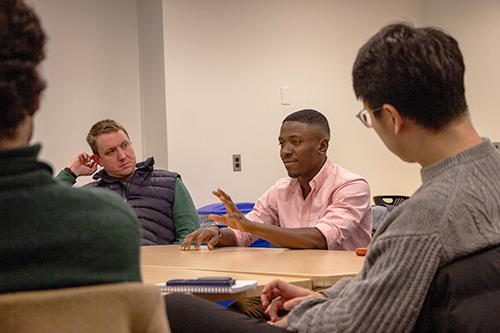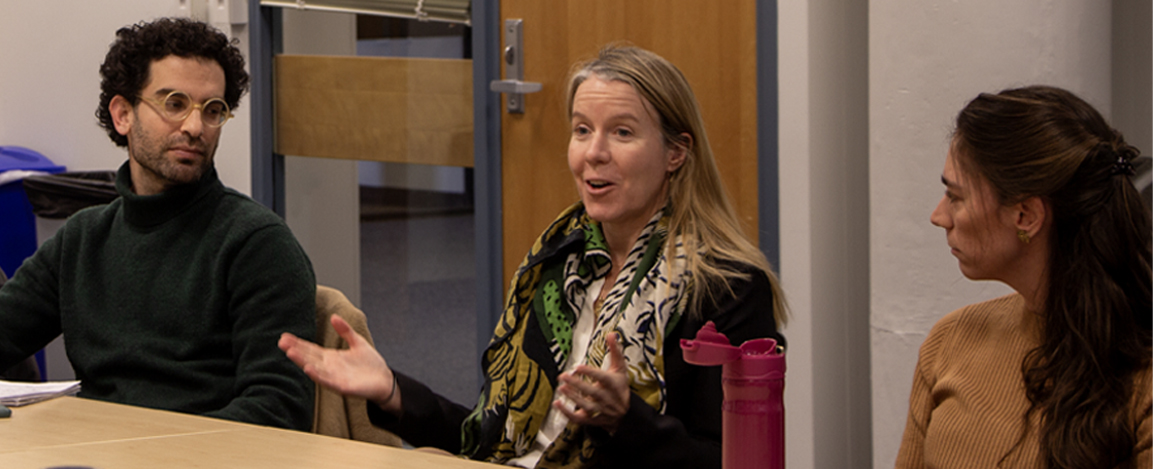The Center hosted the delegates for a post-COP28 event to reflect on their time at the conference. The CIS event, “MIT Reflects on COP28,” was held on January 17th and was sponsored by the Center's newly formed Climate/MIT initiative.
Photo above: Attendees at the CIS event included MIT COP28 delegates (left to right) Andre Zollinger, Bethany Patten, and Marcela Angel.
The 2023 United Nations Climate Change Conference (COP28) took place from November 30 to December 13 in Dubai, United Arab Emirates. Approximately two dozen members of the MIT community were among the reported 85,000 attendees. The MIT delegation was sponsored by the MIT Climate Nucleus, the faculty committee on climate.
In addition to some major takeaways—such as tripling global renewable energy capacity, phasing out coal production, and achieving net zero carbon emissions by 2050—there was also progress made on a smaller scale in meetings and side events.
To learn more about these “micro” experiences, the Center invited the MIT delegates to an event, “MIT Reflects on COP28,” on January 17th. A majority of these delegates, including the director of CIS, Evan Lieberman, joined the discussion either in person or on Zoom.
The talk was sponsored by Climate/MIT, a newly formed initiative at CIS that is co-led by Drew Story, PhD, managing director of the MIT Policy Lab, and Madeleine Smith, managing director of the MIT-Denmark Program.
The talk was sponsored by Climate/MIT, a newly formed initiative at CIS that is co-led by Drew Story, PhD, managing director of the MIT Policy Lab, and Madeleine Smith, managing director of the MIT-Denmark Program.
The delegates at the CIS event expressed interest in transition finance and incentivizing institutions to fund renewable energy methods and regenerative agriculture. Other topics discussed included biodiversity, environmental justice, and sustainability technology. They all agreed, however, that exchanging ideas at COP28 was the most fruitful.
“I think some of the value added is that all of us can provide, for each other and for others in the MIT community, what we saw firsthand and how we experienced it,” said Lieberman, the Total Professor of Political Science and Contemporary Africa.
Story added that sending the MIT delegation to COP28 helps diffuse knowledge, explaining that the MIT delegation “shared what they know about climate science impacts and solutions” and “provided technical expertise to negotiators, parties, UN agencies, and others.” In turn, the delegation learns “from other researchers, policymakers, community leaders, advocates, activists and young people from around the world.”
Runako Gentles ’24, a Course 1 major, focused on ways to cut carbon emissions in his home country of Jamaica. He described his time at COP28 as a “great networking experience. I got to connect with a lot of Jamaican delegates.” Gentles added: “It was really cool that, even though I could go to COP in the future many times, this was likely my last opportunity as an undergraduate to attend COP and to come up to people working in the UN.”
Runako Gentles ’24, a Course 1 major, focused on ways to cut carbon emissions in his home country Jamaica. He added that attending COP-related events was like a springboard, a jumpstart to actually being more impactful.
Gentles said that he aspires to work for the UN and that meeting Caribbean delegates at COP28 will help in his career. He stated that attending COP-related events was “like a springboard, a jumpstart to actually being more impactful after” and that COP28 “was an amazing opportunity to just connect with people who [he] probably just wouldn’t meet everyday.”

Alessandra Fabbri, a PhD candidate at the School of Architecture and Planning, was also attentive to environmental policies at COP28. She was specifically interested in the Paris Agreement’s Article 6, which emphasizes giving financial support to developing countries to address climate change-related issues.
Fabbri said, “I wanted to see the evolution of Article 6 in terms of coordination and cooperation between the different nation states, and how they were approaching carbon emissions offsets.” She continued, “There is still a reference to developing vis a vis developed countries [in the negotiations], which has been elaborated and analyzed and criticized a lot in literature, because it always begs the question—developing towards what?”
Fabbri explained that the non-consideration of the deeper ramifications of those concepts can strongly impact the COP28 negotiations. She also said that since COP28 had an exceptionally high attendance,” as there was a “strong competition for an entry into sessions.
“There were some panels that didn’t have or had few attendees due to scheduling conflicts,” Fabbri said. “So that detracted a little bit from what I think the main point of this whole event, which is trying to find solutions for climate change.”
In addition to the MIT delegation, there were others from the Institute who attended as representatives for other groups, explained one of the delegates. Thus, it was difficult to know everyone from MIT who attended. The delegates concluded that for future conferences, they would like to find ways for all the MIT attendees to connect as a community. In turn, this would better enable them to share their COP experiences and to learn more about the climate-related work being done by their colleagues.
MIT Reflects on COP28 is available to view on the Center's YouTube Channel. If you'd like to learn more about Climate/MIT, and other activities at CIS, please subscribe here.
This article was edited with permission from a published piece in the Tech on January 25, 2024.




